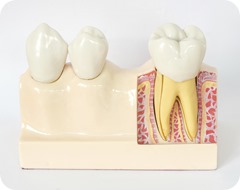Gingivitis (a reversible inflammation of the gums) and periodontitis (a  destructive non reversible condition resulting in loss of the connective tissue attachment of the tooth to the bone) are oral inflammatory infections. Periodontitis is thought to be caused by an immune response stimulated by plaque around the margins of the gingiva. One way that the white blood cells contribute to the periodontitis is likely by releasing proteolytic enzymes and reactive oxygen species (ROS). There is also some suggestion that the periodontal inflammation might be associated with oxidative stress as well. Other research has shown that CoQ10 is an antioxidant and that there is a deficiency of CoQ10 in the gingiva of individuals with periodontitis.
destructive non reversible condition resulting in loss of the connective tissue attachment of the tooth to the bone) are oral inflammatory infections. Periodontitis is thought to be caused by an immune response stimulated by plaque around the margins of the gingiva. One way that the white blood cells contribute to the periodontitis is likely by releasing proteolytic enzymes and reactive oxygen species (ROS). There is also some suggestion that the periodontal inflammation might be associated with oxidative stress as well. Other research has shown that CoQ10 is an antioxidant and that there is a deficiency of CoQ10 in the gingiva of individuals with periodontitis.
The current study was a randomized, double-blind, controlled, parallel group clinical trial. A total of 30 non-smokers (14 women and 16 men), who had a plaque index score of > 2 and a gingival index score of > 2 with at least three non-adjacent interproximal sites with a pocket depth of > 5 were enrolled in the study. Individuals were randomized into the test group in which they took oral CoQ10 120 mg/day after scaling and root planing and the control group, in which patients received an oral placebo after scaling and root planing. The oral supplement or placebo was given for 3 months and did not use any mouthwash. The plaque index, gingival index and probing were done at baseline, one month and 3 months of the study period.
Results: Both groups showed marked reduction of the periodontal parameters at one month and three months. There was no significant difference in plaque index and pocket depth between the two groups. However, in the CoQ10 group, there was a significant difference in gingival inflammation at one month and 3 months compared to the placebo group.
Commentary: Bacterial plaque is the primary cause of periodontal disease and it is currently thought that the majority of periodontal tissue destruction is caused by an insufficient host response to the plaque bacteria and their products. Responsible mechanisms include an imbalance between proteolytic enzymes and their inhibitors, and an insufficient antioxidant defense to reactive oxygen species. Past research on CoQ10 has included improved oral hygiene plus CoQ10 and topical application of CoQ10 to periodontal pockets. Past research demonstrated that CoQ10 had anti-inflammatory and antioxidant effects as well as reduced bleeding of the gums. It may in fact be the anti-inflammatory properties of CoQ10 rather than the anti-oxidant properties. The current study supports that point of view and/or a possible deficiency of gingival CoQ10 in that while there was no difference in the plaque index and pocket depth between the oral CoQ10 group and placebo, there was a significant reduction in gingival inflammation in the oral CoQ10 group.
Reference: Manthena S, Venkata M, Rao R, et al. Effectiveness of CoQ10 oral supplements as an adjunct to scaling and root planning in improving periodontal health. J Clinical and Diagnostic Research 2015; 9(8): 26-28

